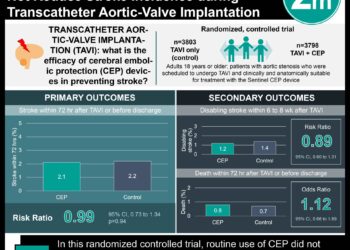Extracorporeal CPR and conventional CPR similarly improve cardiac arrest survival
1. In patients with refractory out-of-hospital cardiac arrest, extracorporeal cardiopulmonary resuscitation (CPR) had comparable effects on survival compared to conventional CPR.
2. Extracorporeal CPR and conventional CPR also had similar effects on survival with a favorable neurologic outcome in patients with refractory out-of-hospital cardiac arrest.
Evidence Rating Level: 1 (Excellent)
Study Rundown: Early initiation of basic life support, high-quality chest compressions, and external defibrillation are crucial steps for managing out-of-hospital cardiac arrest. However, when these measures fail, the chance of survival with CPR declines rapidly over time. Extracorporeal CPR, the addition of extracorporeal membrane oxygenation to standard advanced cardiac life support, has been proposed to restore perfusion with the goal of limiting hypoxic brain injury and allowing for increased treatment of the underlying cause of cardiac arrest. However, there is a gap in knowledge as to understanding the effect of extracorporeal CPR on survival and neurologic outcomes as compared to conventional CPR in patients with refractory out-of-hospital cardiac arrest and initial ventricular arrhythmia. Overall, this study found that extracorporeal CPR and conventional CPR had similar effects on survival with a favorable neurologic outcome at 30 days in patients with refractory out-of-hospital cardiac arrest caused by an initial ventricular arrhythmia. This study was limited by early randomization which led to a considerable number of patients who had a return of spontaneous circulation between random assignment and hospital arrival, as well as crossovers by three patients who died despite receiving extracorporeal CPR. Nevertheless, these study’s findings are significant, as they demonstrate that extracorporeal CPR and conventional CPR have similar outcomes with regard to survival and neurologic outcomes in patients with out-of-hospital cardiac arrests.
Click to read the study in NEJM
Relevant Reading: Therapeutic Hypothermia after Out-of-Hospital Cardiac Arrest in Children
In-Depth [randomized controlled trial]: This multicenter, randomized controlled trial was conducted in the Netherlands. Patients who were 18 to 70 years of age who had a witnessed, refractory out-of-hospital cardiac arrest with an initial ventricular arrhythmia (either ventricular fibrillation or ventricular tachycardia or a shockable rhythm detected by an automated external defibrillator) were eligible for the study. Patients who had a return of spontaneous circulation with sustained hemodynamic recovery within 15 minutes, terminal heart failure (New York Heart Association class III or IV), severe pulmonary disease (grade III or IV on the Chronic Obstructive Pulmonary Disease Global Initiative for Obstructive Lung Disease criteria), disseminated oncologic disease, obvious or suspected pregnancy, bilateral femoral bypass surgery, known contraindications for extracorporeal CPR, known advance health-care directive prohibiting resuscitation or invasive ventilation, and expected time interval of more than 60 minutes between the initial cardiac arrest to the initiation of the cannulation procedure were excluded from the study. The primary outcome measured was survival with a favorable neurologic outcome. Outcomes in the primary analysis were assessed via an intention-to-treat basis with a mixed logistic model. Based on the primary analysis at 30 days, 14 patients (20%) in the extracorporeal CPR group were alive with a favorable neurologic outcome, as compared with 10 patients (16%) in the conventional CPR group (odds ratio, 1.4; 95% confidence interval, 0.5 to 3.5), with the number of adverse events in each group similar (p>0.05). Overall, this study demonstrated that extracorporeal CPR and conventional CPR have similar effects on survival with a favorable neurologic outcome in patients with refractory out-of-hospital cardiac arrest.
Image: PD
©2023 2 Minute Medicine, Inc. All rights reserved. No works may be reproduced without expressed written consent from 2 Minute Medicine, Inc. Inquire about licensing here. No article should be construed as medical advice and is not intended as such by the authors or by 2 Minute Medicine, Inc.







